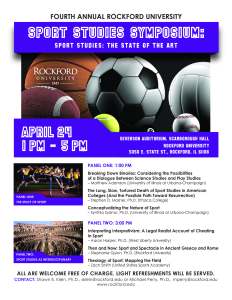I'm proud to announce the publication of my edited volume: Defining Sport: Conceptions and Borderlines. Several contributors to this blog contributed to this volume.
This is the first volume in Lexington Books' Studies in the Philosophy of Sport series. [As editor of this series, I'd love to hear ideas for contributions to this series. Contact me with ideas.]
 Part One examines several of the standard and influential approaches to defining sport. Part Two uses these approaches to examine various challenging borderline cases (e.g. bullfighting, skateboarding, esport, Crossfit). These chapters examine the interplay of the borderline cases with the definition and provide a more thorough and clearer understanding of the definition and the given cases.
Part One examines several of the standard and influential approaches to defining sport. Part Two uses these approaches to examine various challenging borderline cases (e.g. bullfighting, skateboarding, esport, Crossfit). These chapters examine the interplay of the borderline cases with the definition and provide a more thorough and clearer understanding of the definition and the given cases.See the full listing of chapters and contributors on my SportsEthicist blog.
It is available from Lexington, Amazon, and other booksellers. There is also an ebook version.
